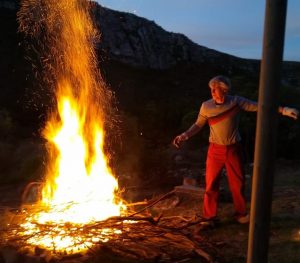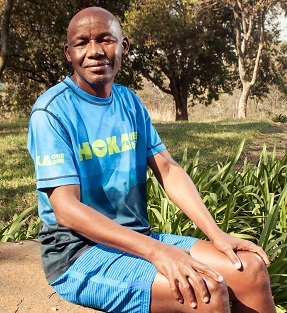
I was 43 back in 1996 when a doctor whom I’d seen for an executive health medical asked me when I’d last had my PSA tested. I’d never heard of PSA. And so began a long journey. My first reading was 4.5 which I learnt was outside the normal range and far higher than a man of forty-odd should have. Things got worse from there. By the early 2000’s I’d had PSA checks more or less every six months and more fingers stuck up my rectum than I care to boast about. But the results were always the same – ‘small and soft’ (the sort of situation I face now but on the other side!). The PSA tests generated more interest because the score kept rising. I went on to heavy antibiotics and eventually I had my first biopsy. What joy! The results came back negative. I said “I told you so”, everyone spoke of a ‘false positive’, I urinated and secreted blood for a while – and then things went back to normal.
By 2010 my PSA reached 10.8 and after all those fingers again, I went for yet another biopsy. Also negative. And then my PSA began to fall. My urologist was convinced that whatever it was that had caused the high readings (for 15 years or so!)had now healed itself. (Be warned– I’ve since learnt from my oncologist that cancer can ‘put the squeeze’ on the PSA reading so that a falling reading can actually mean advancing cancer…). Then in mid-2017, I had my lowest reading ever, 4.02, and my urologist retired. Almost scornfully, I went to one of his partners who, after the finger check (“not so small John, nor so soft…”), suggested I go for an MRI. Ho, hum. Off I went to the Kingsbury and fell asleep in that noisy machine. The good doctor phoned me to say that I should come to see him. I was convinced I was fine.My PSA was falling, for heaven’s sake, and it was year-end and I just forgot.
In July 2018 I went for my usual mid-year PSA test and it was 4.4 but this time the very good doctor reminded me that he had had something to tell me. It turned out that the MRI had indicated that not only did I have cancer but that it was quite likely already out of the capsule. This led to a third biopsy and the confirmation that I had prostate cancer alright but with a Gleason score of 7 (3 plus 4) which is a Gleason grade group score of 2 . (Gleason grade group 1 is the least aggressive and Gleason grade group 5 is the worst). I needed to have the prostate out in a hurry. “No problem,” said everyone, “no one battles with prostate cancer. They whip it out, you pee yourself for a bit and then everything comes right”. Off to a urologist who, I learned, did something called a radical nerve-sparing robotic prostatectomy and then off for another more definitive MRI out in Milnerton. The results of that little expedition were sobering and perhaps for the first time I began to realise that I might be in some trouble. My Gleason score was not a low 7, but a solid 8 which is a Gleason grade group 4. The cancer was not confined to the prostate but had invaded the seminal vesicles and the nerves that run along both sides of the prostate which are responsible for erections.I was at Stage 3(b). I had all the signs of locally advanced cancer. About the only good news was that the cancer did not appear to be in my lymph nodes from where it can spread all over the body and particularly into the bones (this is advanced metastatic prostate cancer for which there is no cure). Nevertheless, despite what I was beginning to understand was a fairly advanced and aggressive cancer – if localised to the pelvic area – the urologist was pretty confident that he could get it all out.
Going into theatre was nothing special; the surgeon’s clerical assistants do all the preparatory work with the medical aids and you just pitch up early in the morning of the day of the operation. In my case the op was in the afternoon and I spent a quiet morning reading and getting my vital statistics taken by a succession of pleasant nurses. Then it was time for theatre and I was wheeled to the operating area where the anaesthetist met me and took me through the drill. To add to the interest, my surgeon had recently taken on a new robotic operating machine and a crowd of newspaper reporters and photographers were there to get some copy and pictures. I learned that I was his 16th patient on the new machine, which was comforting. When I was wheeled into theatre, my surgeon greeted me from the far side of the room where he was seated in front of a monitor. The robotic machine which was going to do all the work (it sends in five arms, one with a camera) was at the far side of the room. I was moved toward the machine and told that my legs would be put into stirrups but I don’t recall getting that far. Someone put a mask over my nose and I was gone…..It was the 9thNovember – I had my very own personal 9/11 experience.
The op went well enough, if a little longer in duration than usual because the good doctor had to ensure that all the cancerous tissue was removed in order to ensure negative surgical margins (the pathology lab checks all tissue removed for cancer cells). Recovering from the procedure wasn’t much of a hassle – I’m fit, which helped. My urologist assured me that despite having to go to the margins, he felt that he’d ‘got it all out’, along with a seminal vesicle and about 75% of my bilateral nerves. This was not great news on the erectile front but hey, if it meant that the cancer was gone, both my wife and I were up for it. Well, sort of.
I’d had some training on how to hold my urine with the single remaining sphincter and slowly, over two to three months, that element of my pelvic function returned to normal, along with the odd mishap. I’m a regular short distance runner, so I rested for about a week then started walking for another and within two weeks I was running again, ‘nappies’ and all! I even had the experience while running, early on, of hanging onto my pad as I jogged past some other runners who asked if I was okay. I explained that ‘my nappy had come undone’ and we had a good laugh and then chatted about the rigours of prostate cancer! Things went well. I got back into my normal routine and was running with smaller and smaller pads until, after a few leaks, eventually no drips at all. If all the cancer was out, the operation was entirely successful.
But it wasn’t all out.In February 2019, I had my first post-op PSA test. I popped across from my office for what I hoped was to be a short visit, hoping to hear that my PSA reading was down below 0.02, or better, at the undetectable level. But it wasn’t. The reading was 0.18, far too high for a lad with a Gleason 8 and Stage T3 readings. I needed further treatment. The rest of the session was about meeting someone I hoped never to have to visit – an oncologist.
Now things began to change. I found myself in a state of limbo not knowing whether the reading might be indicative of cancer not detected and not removed during the surgery, or cancer in some other part of the greater pelvic area or worse, in some more distant body part, or in the bloodstream, either dying away (one prays) or looking for a place to hook up. And that is what the oncologist and the wonderful folk at the Radiation Department, down in the bowels of the Rondebosch Oncology Hospital, wanted to sort out.
At this stage I want to digress to observe that this is a very good time to get a book by Dr Patrick Walsh called “(Dr Patrick Walsh’s) Guide to surviving prostate cancer”. You’re no longer part of that nice big fraternity who had the op and all is well. While they’re focusing on getting out of pads, how quickly their erectile function returns and getting back on the road or into the gym, you have other things on your mind. You’re part of a much smaller group for whom the operation was not wholly successful (but a very good thing, nevertheless), and you’re starting to think about how long you’ve got to live! Doctor Walsh’s book gets you in touch with everything you need to know and probably quite a lot you don’t. But being informed helps you to ask questions and to make decisions.
This is also a good time to find others like you, ‘ in the same boat’ as it were, who can ease the strain of being alone out there. As you’ll gather, I’m happy to chat about the various aspects of the disease, the surgery, therapy, exercise and my own personal condition – what does and doesn’t work. It’s good to find others to chat to because it helps to put things in order, in perspective and it can help with decision-making. Also you need to talk to those you love. Keep them in the picture; they are your best support. And if I may suggest, don’t get too embarrassed by what you can’t do anymore or may perhaps never be able to do again. I’ve found it much easier to laugh at the issues than to be depressed by them. What the hell, you get to live once and we’re on a journey just a little different from others. The prognosis is not all doom and gloom.
Anyway, the oncologist told me that because they couldn’t know where this 0,18 PSA reading was coming from, they would assume it was from the ‘prostate bed’, the area where they had operated. They would focus therapy in that area and in the nearby lymph nodes. So, I was going to have 34 bouts of external beam radiation which involves aiming high-intensity beams precisely at that area to destroy any remaining cancer cells. Just how precisely is another story which isn’t of consequence here, but you end up with little tattoos to help the therapists position you under the machines! And because prostate cancer is hormone sensitive (weakened in a low testosterone environment) to further enhance the chances of killing off what cancer remained, I’d be getting injections of something called Luteinizing Hormone-Releasing Hormone (LHRH) agonist, a form of chemical castration. This treatment, also known as Androgen Deprivation Therapy (ADT), turns regular bursts of instructions from the pituitary gland into one long unbroken signal which confuses the hell out of the bits and pieces between itself and the testes. The end result is a shutdown of testosterone production from the testes. That’s how I remember it, anyway.
I found absolutely no discomfort associated with the radiation therapy – you just lie on a table of sorts, attended to by wonderful, kind, friendly radiation therapists, while the machine buzzes around you for 10 to 15 minutes.Getting away for 34 consecutive working-day sessions, however, is a hassle. And the hormone injection, to implant a small pellet which secretes its contents happily into your abdominal fat over the next three months, is something to remember. The needle is bigger than a bayonet, but hey, it’s only once every three months. You’ve got lots of time to recover and you almost forget the experience….. But don’t be fooled, hormone therapy is not a fun ride. I’ve had two major negative responses – hot flushes, which seriously impact one’s sleep, and a serious loss of stamina when exercising – not surprisingly, because I have no testosterone. The hot flushes hit you regularly but it’s those at night which make a lasting impression. The loss of stamina has gotten tougher as the treatment has progressed.And remember, this is aside from the complete loss of libido and erectile function (if you’d got it back, in between!) -‘you lose your software, your firmware, your hardware, your desire, your ability and um.. any hard evidence’. In addition I’ve lost a lot of my body hair which is no big deal; my skin has dried considerably; my balance has been affected (although I have complicating factors here) but, those aside, there are a lot of other possible side effects, far more serious. Doctor Walsh’s book spells them out in some detail, moreso than the doctors do, be warned. The message is to keep as fit as possible despite the increased effort required. Don’t lose muscle mass, don’t put on weight, watch your vital signs…..and don’t listen to the little voice that says you can’t do it, because that’s tempting. You can and you must push yourself.
I’m a year into my hormone treatment. Along the way, I’ve had three PSA readings which have come out at ‘below 0.01-undetectable’. That’s great, but it’s also what it should be, given that I’m on ADT. I’m battling with the impact of the interrupted sleep and my running, which I try to do five or six times a week, is becoming tougher with each injection. My exercise routine is less impacted, strangely, than my aerobic exercise, but it too has suffered. My body shape has changed, subtly, with my fat moving from my hips to my belly, though I’ve been able to keep my weight down without much effort. It’s not great fun, though, I confess.
How long does one stay on this LHRH/ADT stuff? At the time I began writing this tome, my oncologist had just come back from a high level overseas oncology convention where this very issue was debated. Despite what Doctor Walsh notes in his book, namely, that there is no benefit in extending hormone therapy beyond 9 months, more up-to-date evidence suggests that 18 months is the ideal length of time. Less, and you don’t give the body enough time to work on the weakened cancer which has survived radiation; longer, and you take a hammering along with no evidence of further benefits (at least that is how I understand it).
I’m now into my second year on LHRH agonist therapy. I work for a church and I’ve adapted my life and my workday (with thanks to my colleagues) around the impact of poor sleep. My wife and family have been great support. So too have the lads who are part of our little group still undergoing treatment. Lots of laughs as we speak of the struggles and successes. As I’ve said, I try to exercise everyday and I’ve found that even as my stamina slowly wanes, my strength is pretty much unaffected. Most importantly I feel that my faith keeps me balanced and keeps things in perspective. I do earnestly propose, as does Doctor Walsh in his great book, that if you are a prostate cancer sufferer this is a very good time, in the context of your mortality, to carefully consider the reality of ‘The Transcendent’. This provides not simply comfort (referred to cynically by some as ‘a crutch’), but a real sense of purpose, which one can practise by simply reaching out to another sufferer…..
Keep positive; keep communicating, keep fit and keep the faith.
John McPetrie 042020.



